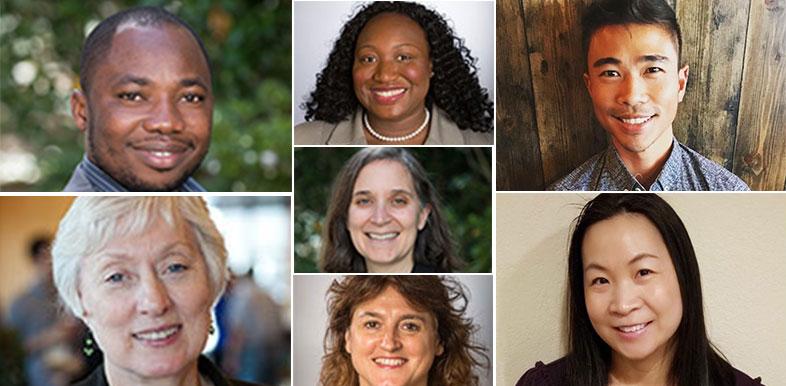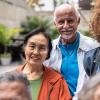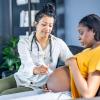
Meet the UCSF Nursing Faculty Working to Illuminate COVID’s Impact
The COVID-19 public health crisis has dramatically altered every facet of daily life, from public health and the economy to social norms and cultural traditions.
Researchers at the UCSF School of Nursing are working to illuminate the pandemic’s impacts, especially on diverse and vulnerable communities. Together, they aim to develop and implement practical solutions that improve health care, shape policy, and prepare government agencies and health care organizations to better manage future crises.
Meet some of the UCSF nursing faculty leading research in the COVID-19 arena:
Advancing Community Health Amid a Global Health Crisis
Orlando Harris, PhD, MPH, FNP, serves on the national COVID-19 Prevention Network’s expert peer review panel, established by the National Institute of Allergy and Infectious  Orlando Harris Diseases. As an expert panelist, Harris reviews federally sponsored COVID-19 vaccine efficacy trial protocols, and reports on the impact, ethics and recommendations for African American/Black communities.
Orlando Harris Diseases. As an expert panelist, Harris reviews federally sponsored COVID-19 vaccine efficacy trial protocols, and reports on the impact, ethics and recommendations for African American/Black communities.
In addition to advising on these federal efforts, Harris is leading a research study to examine how COVID-19 and the shelter-in-place orders have affected Black and Latino sexual minority mens’ ability to access care and COVID-19 related vaccine barriers. The pandemic has disrupted HIV treatment and prevention services for this community, and Harris aims to understand the full impact of this problem.
 Kristen Harknett Kristen Harknett, PhD, is focusing her attention on the country’s 25 million service workers who have been significantly impacted by the pandemic. Many in the retail and food service industries have lost their livelihoods due to layoffs or have had their work hours dramatically reduced. Others, such as grocery store or pharmacy workers are essential, frontline workers who risk exposure to COVID-19 each time they report to work.
Kristen Harknett Kristen Harknett, PhD, is focusing her attention on the country’s 25 million service workers who have been significantly impacted by the pandemic. Many in the retail and food service industries have lost their livelihoods due to layoffs or have had their work hours dramatically reduced. Others, such as grocery store or pharmacy workers are essential, frontline workers who risk exposure to COVID-19 each time they report to work.
“These workers are continuing to show up to work — stocking shelves, and ringing up and delivering essential food and medicine — risking exposure to a highly contagious and serious illness and facing increased workloads due to co-workers calling out sick,” Harknett said.
Harknett is studying survey data collected from almost 20,000 service workers nationwide during the pandemic to better understand the impact on these workers. Her findings are helping to inform policy discussions about workplace safety, hazard pay, and the need for universal paid sick leave.
Jerry John Nutor, PhD, MS, RN, is working to understand how prepared health care workers are to manage the COVID-19 public health  Jerry John Nutor, Julene Johnson challenge in Ghana, which has witnessed skyrocketing infection rates. This is the first study in Ghana to examine providers’ concerns about preparedness during the pandemic, and is a partnership with researchers in Ghana and Kenya. The team’s findings will guide the response to COVID-19 and advise policy development in Ghana.
Jerry John Nutor, Julene Johnson challenge in Ghana, which has witnessed skyrocketing infection rates. This is the first study in Ghana to examine providers’ concerns about preparedness during the pandemic, and is a partnership with researchers in Ghana and Kenya. The team’s findings will guide the response to COVID-19 and advise policy development in Ghana.
Nutor, along with Associate Dean Julene Johnson, PhD, are also exploring the impact that music has had on informing Ghanaians about the dangers of COVID-19. They analyzed 28 songs that contained specific themes around building awareness of COVID-19 and its impact. The study demonstrated music’s ability to successfully inform people during a public health crisis and promote positive behaviors. Johnson also mentored Chinaza Ochi, a second-year medical student, on a project that found most participants still engaged in the arts during the pandemic, although in a different capacity due to closure of community arts programs and faith-based organizations.
 Van Park, Linda Park Van Park, PhD, MPH, and Linda Park, PhD, RN, FAAN, are examining the impact of COVID-19 on Asian Americans and Pacific Islanders’ health, including their experience with COVID-19 related discrimination, COVID-19 vaccine willingness and concerns, ability to access health care, caregiving, employment, social support, coping strategies and access to digital technology. The results of their nationwide online survey will help inform future policies, programs and additional research that can alleviate COVID-19’s effects on this community. The team is leveraging the largest multi-lingual registry of AAPI — the goal is to recruit 10,000 participants — through the CARE initiative, which was created to address the gap and reduce disparities in research participation among AAPI individuals.
Van Park, Linda Park Van Park, PhD, MPH, and Linda Park, PhD, RN, FAAN, are examining the impact of COVID-19 on Asian Americans and Pacific Islanders’ health, including their experience with COVID-19 related discrimination, COVID-19 vaccine willingness and concerns, ability to access health care, caregiving, employment, social support, coping strategies and access to digital technology. The results of their nationwide online survey will help inform future policies, programs and additional research that can alleviate COVID-19’s effects on this community. The team is leveraging the largest multi-lingual registry of AAPI — the goal is to recruit 10,000 participants — through the CARE initiative, which was created to address the gap and reduce disparities in research participation among AAPI individuals.
Unpacking Nurses’ Experiences During the Pandemic
Leslie Dubbin, PhD, RN, Janine Cataldo, PhD, RN, and Janet Shim, PhD, MPP, are working to shed light on the experiences of RNs  Leslie Dubbin, Janine Cataldo, Janet Shim caring for COVID-19 patients. Their California-wide study delves into how these experiences have influenced nurses’ views of the health care system and its response to the pandemic; impact that caring for COVID-19 patients has had on their physical and mental health as well as family, professional and social connections; outlooks for their continued frontline work and future of the nursing profession; and ethical/moral dilemmas they may have faced while providing care during the pandemic. The team’s preliminary analysis demonstrates that California nurses are determined to maintain their frontline role during this pandemic; however many acknowledge significant negative impacts to their physical and emotional health. Nurses are urging health care systems to focus on, and invest in, interventions that support the health and well-being of frontline workforce.
Leslie Dubbin, Janine Cataldo, Janet Shim caring for COVID-19 patients. Their California-wide study delves into how these experiences have influenced nurses’ views of the health care system and its response to the pandemic; impact that caring for COVID-19 patients has had on their physical and mental health as well as family, professional and social connections; outlooks for their continued frontline work and future of the nursing profession; and ethical/moral dilemmas they may have faced while providing care during the pandemic. The team’s preliminary analysis demonstrates that California nurses are determined to maintain their frontline role during this pandemic; however many acknowledge significant negative impacts to their physical and emotional health. Nurses are urging health care systems to focus on, and invest in, interventions that support the health and well-being of frontline workforce.
 Clockwise, from top left, Jyu-Lin Chen, Rosalind De Lisser, Tom Hoffmann, Mijung Park, Jerry John Nutor and Hannah Jang. Jyu-Lin Chen, PhD, RN, FAAN, leads a team that is taking a close look at UCSF’s COVID-19 patient hotline, which is headed by nurses and nurse practitioners and has played a critical role in serving patients’ needs during the pandemic. The study examines how this model has influenced patient compliance and their health, as well as identify risk factors and vulnerable and marginalized populations. Chen’s team includes UCSF researchers Rosalind De Lisser, MS, NP, RN, Thomas Hoffmann, PhD, alumna Hannah Jang, PhD, MS, Jerry John Nutor, PhD, MS, RN, and Mijung Park, PhD, MPH, RN.
Clockwise, from top left, Jyu-Lin Chen, Rosalind De Lisser, Tom Hoffmann, Mijung Park, Jerry John Nutor and Hannah Jang. Jyu-Lin Chen, PhD, RN, FAAN, leads a team that is taking a close look at UCSF’s COVID-19 patient hotline, which is headed by nurses and nurse practitioners and has played a critical role in serving patients’ needs during the pandemic. The study examines how this model has influenced patient compliance and their health, as well as identify risk factors and vulnerable and marginalized populations. Chen’s team includes UCSF researchers Rosalind De Lisser, MS, NP, RN, Thomas Hoffmann, PhD, alumna Hannah Jang, PhD, MS, Jerry John Nutor, PhD, MS, RN, and Mijung Park, PhD, MPH, RN.
Jennifer James, PhD, MSW, MSSP, has worked to detail the experiences of Black birthing people and Black birthworkers during the  Jennifer James pandemic. Her recent publication gives voice to the challenges birthworkers faced due to the intersection of COVID-19 restrictions and structural racism. She highlights the innovative strategies used to support Black birthing people in the pandemic and beyond. James is also examining the implications of the pandemic for incarcerated women over age 50 with chronic illnesses. She is conducting interviews with women released from California prisons and jails during the pandemic, as well as health care providers working in those environments and advocates and organizers supporting decarceration efforts.
Jennifer James pandemic. Her recent publication gives voice to the challenges birthworkers faced due to the intersection of COVID-19 restrictions and structural racism. She highlights the innovative strategies used to support Black birthing people in the pandemic and beyond. James is also examining the implications of the pandemic for incarcerated women over age 50 with chronic illnesses. She is conducting interviews with women released from California prisons and jails during the pandemic, as well as health care providers working in those environments and advocates and organizers supporting decarceration efforts.
Ensuring a Safe Return to Work
 Sandra Domeracki Sandra Domeracki, MS, RN, FAAOHN, is studying whether a certain lab test (reverse transcriptase-polymerase chain reaction) that was initially recommended by the CDC can effectively measure the degree of viral infection in health care workers who have tested positive for COVID-19. Domeracki’s study is being used to help develop strategies for when health care workers can safely return to work after a COVID-19 infection. She is also working on a quality improvement effort related to health care workers’ household exposure to COVID-19 and its correspondence to viral load in infection, providing useful potential insights into the epidemiology of COVID-19.
Sandra Domeracki Sandra Domeracki, MS, RN, FAAOHN, is studying whether a certain lab test (reverse transcriptase-polymerase chain reaction) that was initially recommended by the CDC can effectively measure the degree of viral infection in health care workers who have tested positive for COVID-19. Domeracki’s study is being used to help develop strategies for when health care workers can safely return to work after a COVID-19 infection. She is also working on a quality improvement effort related to health care workers’ household exposure to COVID-19 and its correspondence to viral load in infection, providing useful potential insights into the epidemiology of COVID-19.
A Call for Safer Staffing in Nursing Homes
 Susan Chapman, Charlene Harrington, Leslie Ross, Elizabeth Halifax. Nursing homes have been especially susceptible to COVID-19 outbreaks among both residents and staff. Susan Chapman, PhD, RN, FAAN, Charlene Harrington, PhD, RN, Leslie Ross, PhD, and Elizabeth Halifax, PhD, RN, and colleagues found that California nursing homes with RN staff levels below recommended levels were twice as likely to have COVID-19 resident infections. In their study that examined more than 1,000 nursing homes in the state, about 80 percent fell short of recommended RN staffing levels. Their findings emphasize the need for establishing and enforcing minimum staffing standards at the federal and state levels to assure resident safety and quality care. Harrington and Ross also co-authored a report commissioned by the California Health Care Foundation, investigating COVID-19’s impact in nursing homes.
Susan Chapman, Charlene Harrington, Leslie Ross, Elizabeth Halifax. Nursing homes have been especially susceptible to COVID-19 outbreaks among both residents and staff. Susan Chapman, PhD, RN, FAAN, Charlene Harrington, PhD, RN, Leslie Ross, PhD, and Elizabeth Halifax, PhD, RN, and colleagues found that California nursing homes with RN staff levels below recommended levels were twice as likely to have COVID-19 resident infections. In their study that examined more than 1,000 nursing homes in the state, about 80 percent fell short of recommended RN staffing levels. Their findings emphasize the need for establishing and enforcing minimum staffing standards at the federal and state levels to assure resident safety and quality care. Harrington and Ross also co-authored a report commissioned by the California Health Care Foundation, investigating COVID-19’s impact in nursing homes.
Prioritizing Maternal and Infant Health
Ifeyinwa Asiodu, PhD, RN, IBCLC is leading a new study to examine perinatal and infant feeding experiences of California-based  Ifeyinwa Asiodu, Monica McLemore, Hendrix Erhahon women and birthing people during the COVID-19 pandemic. In addition, Asiodu recently co-authored a study examining more than 250 infants to understand the birth outcomes for women who tested positive for COVID-19. The interdisciplinary research team found the likelihood of adverse outcomes — such as preterm birth, NICU admission, and respiratory disease — for infants born to mothers testing positive for COVID-19 did not differ compared to mothers who tested negative. Asiodu is also collaborating with the Gaw Lab to address the lack of data on vaccine efficacy and safety in pregnant and lactating populations through the COVID-19 Vaccine in Pregnancy and Lactation Study.
Ifeyinwa Asiodu, Monica McLemore, Hendrix Erhahon women and birthing people during the COVID-19 pandemic. In addition, Asiodu recently co-authored a study examining more than 250 infants to understand the birth outcomes for women who tested positive for COVID-19. The interdisciplinary research team found the likelihood of adverse outcomes — such as preterm birth, NICU admission, and respiratory disease — for infants born to mothers testing positive for COVID-19 did not differ compared to mothers who tested negative. Asiodu is also collaborating with the Gaw Lab to address the lack of data on vaccine efficacy and safety in pregnant and lactating populations through the COVID-19 Vaccine in Pregnancy and Lactation Study.
Asiodu, along with faculty member Monica McLemore, PhD, RN, and project director Hendrix Erhahon, is also part of an interdisciplinary team that is developing the Reproductive Health Equity and Birth Justice CORE, an adjunct study to the PRIORITY pregnancy registry study. This project aims to help patients and health care providers better understand how COVID-19 impacts pregnant Black, indigenous and people of color and their newborns. McLemore has also utilized funding from the Robert Wood Johnson Foundation to deploy Research Priorities of Affected Communities (RPAC) — a research protocol centered on women with high sociodemographic risk for pre-term birth. So far, the team has partnered with seven organizations to hold RPAC sessions across the country to learn the impact of COVID-19 on BIPOC communities.
Impact on Older Adults
 Elena Portacolone, Julene Johnson Elena Portacolone, PhD, MBA, MPH, and Julene Johnson, PhD, have examined the impact of the pandemic on diverse older adults living alone with cognitive impairment in the Bay Area. In a recent article, Portacolone and Johnson, along with fellow researchers Sahru Keiser, MPH, Jennifer Fung, BS, Elizabeth Rivera, MS, Thi Tran, BA, and Camilla Bykhovsky, BS, have shed light on the precarity of this population. In particular, their study highlighted their fear, extreme isolation, and misinformation during the pandemic. Findings also underscored limited access to services, as well as the importance of home care aides.
Elena Portacolone, Julene Johnson Elena Portacolone, PhD, MBA, MPH, and Julene Johnson, PhD, have examined the impact of the pandemic on diverse older adults living alone with cognitive impairment in the Bay Area. In a recent article, Portacolone and Johnson, along with fellow researchers Sahru Keiser, MPH, Jennifer Fung, BS, Elizabeth Rivera, MS, Thi Tran, BA, and Camilla Bykhovsky, BS, have shed light on the precarity of this population. In particular, their study highlighted their fear, extreme isolation, and misinformation during the pandemic. Findings also underscored limited access to services, as well as the importance of home care aides.
Addressing the Needs of Cancer Patients
The pandemic has been particularly challenging for people already battling a disease, including cancer patients whose immune systems  Christine Miaskowski, Kord Kober, Karen Schumacher, Carol Viele are weakened.
Christine Miaskowski, Kord Kober, Karen Schumacher, Carol Viele are weakened.
With no information available on how COVID-19 affects cancer patients’ health and wellbeing, Christine Miaskowski, PhD, RN, FAAN, and Kord Kober, PhD, have embarked on a study to understand how the pandemic affects their stress levels, anxiety, ability to sleep, and their pain. In a survey of 187 cancer patients, Miaskowski and Kober uncovered “alarmingly high rates of stress and an extraordinarily high symptom burden … exceeding those previously benchmarked in this population and on par with noncancer patients with post-traumatic stress disorder,” they wrote in their paper.
“Clinicians must exhibit increased vigilance in their assessments of patients' level of stress and symptom burden,” they wrote. “Moreover, an increase in referrals to appropriate supportive care resources must be prioritized for high-risk patients.”
Faculty are also working to ensure that oncology patients have the care they need. Miaskowski and colleagues Karen Schumacher, PhD, MS, RN, and Carol Viele, MS, RN, realized that general COVID-19 screening tools were not specific enough to meet cancer patients’ needs. That’s because the symptoms associated with COVID-19 and those associated with the radiation therapy, chemotherapy or targeted therapy that oncology patients receive can overlap, presenting a challenging diagnostic situation for health care providers. So the team developed a COVID-19 screening tool with nurse colleagues in the medical center Emmika Elkin, Maureen Boberg, Mari Cunningham and Lauren Liu that is specifically tailored to triaging and screening cancer patients. The team implemented the new tool at UCSF Health and it may serve as a model for other health systems.
The Burden on Caregivers
 Anita Stewart Anita Stewart, PhD, co-authored to a study exploring the burden that informal caregivers — seldom-trained individuals caring for a family member with an illness or disability — have carried during the pandemic. By utilizing the new Caregiver COVID-19 Limitations Scale, Stewart and her fellow researchers found caregiver stress and pain increased significantly during the early stages of the pandemic among both English-speaking and Spanish-speaking individuals. The accuracy of their new metric could be adapted to measure caregiver effects in other situations, sharpening the lens on the struggles that informal caregivers endure.
Anita Stewart Anita Stewart, PhD, co-authored to a study exploring the burden that informal caregivers — seldom-trained individuals caring for a family member with an illness or disability — have carried during the pandemic. By utilizing the new Caregiver COVID-19 Limitations Scale, Stewart and her fellow researchers found caregiver stress and pain increased significantly during the early stages of the pandemic among both English-speaking and Spanish-speaking individuals. The accuracy of their new metric could be adapted to measure caregiver effects in other situations, sharpening the lens on the struggles that informal caregivers endure.
Supporting the LGBTQ+ Community
 Glenn-Milo Santos, Akua Gyamerah Glenn-Milo Santos, PhD, MPH, has examined COVID-19’s impact on the mental and physical health of gay, bisexual and other men who have sex with men (MSM) worldwide. He found that MSM lacked access to HIV prevention and treatment services and experienced negative economic and mental health impacts. These consequences were greater among racial/ethnic minorities, immigrants, sex workers, socio-economically disadvantage MSM, and MSM living with HIV, underscoring how COVID-19 may deepen health and social inequities. Moreover, those who practiced physical distancing felt more lonely, anxious, and dissatisfied with their sex lives. Research specialist Akua Gyamerah, DrPH, MPH, is leading a study on COVID-19's impacts on gender-based violence and alcohol consumption and treatment among gender minorities as part of Santos’ clinical trial.
Glenn-Milo Santos, Akua Gyamerah Glenn-Milo Santos, PhD, MPH, has examined COVID-19’s impact on the mental and physical health of gay, bisexual and other men who have sex with men (MSM) worldwide. He found that MSM lacked access to HIV prevention and treatment services and experienced negative economic and mental health impacts. These consequences were greater among racial/ethnic minorities, immigrants, sex workers, socio-economically disadvantage MSM, and MSM living with HIV, underscoring how COVID-19 may deepen health and social inequities. Moreover, those who practiced physical distancing felt more lonely, anxious, and dissatisfied with their sex lives. Research specialist Akua Gyamerah, DrPH, MPH, is leading a study on COVID-19's impacts on gender-based violence and alcohol consumption and treatment among gender minorities as part of Santos’ clinical trial.
 Annesa Flentje LGBTQ+ individuals already report experiencing stress and discrimination in health care settings and the pandemic has only exacerbated those negative effects. Annesa Flentje, PhD, is investigating these stressors through The PRIDE Study, a national longitudinal study of LGBTQ+ individuals and other gender and sexual minorities. The study’s surveys seek information on participants’ mental health, behavior and social interactions as well as their experiences in health care settings. Flentje plans to track the mental and physical health of participants for years to determine if the pandemic has lasting effects.
Annesa Flentje LGBTQ+ individuals already report experiencing stress and discrimination in health care settings and the pandemic has only exacerbated those negative effects. Annesa Flentje, PhD, is investigating these stressors through The PRIDE Study, a national longitudinal study of LGBTQ+ individuals and other gender and sexual minorities. The study’s surveys seek information on participants’ mental health, behavior and social interactions as well as their experiences in health care settings. Flentje plans to track the mental and physical health of participants for years to determine if the pandemic has lasting effects.
Providing Support for Health Care Professionals
Deborah Johnson, DNP, RN, PMHNP, president of the International Society of Psychiatric-Mental Health Nurses, a group of more than  Deborah Johnson 400 international academic and clinical professionals, has played a key leadership role in addressing challenges the pandemic has brought upon mental health professionals. Johnson supported the creation of ISPN’s peer support group for nursing professionals who have become distressed by events related to the pandemic. She also guided the organization’s transition to a virtual conference, bringing in much-needed funding to stabilize the group financially and provide much-needed resources to mental health professionals during this challenging time.
Deborah Johnson 400 international academic and clinical professionals, has played a key leadership role in addressing challenges the pandemic has brought upon mental health professionals. Johnson supported the creation of ISPN’s peer support group for nursing professionals who have become distressed by events related to the pandemic. She also guided the organization’s transition to a virtual conference, bringing in much-needed funding to stabilize the group financially and provide much-needed resources to mental health professionals during this challenging time.



